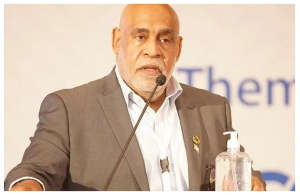The United Nations’ Sustainable Development Goals (SDGs) are facing a significant threat, as less than 20 percent of targets are on track beyond the midpoint to 2030, according to Charles Abani, the UN Resident Coordinator for Ghana.
Addressing the concerning state of the SDGs, Mr. Abani highlighted that close to half of the targets, while showing some progress, are moderately or severely off track. Additionally, he noted that around 30 percent of targets have either seen no movement or regressed below the 2015 baseline.
“If present trends persist, by 2030, a staggering 575 million people will remain trapped in extreme poverty and 84 million children will be out of school,” Mr. Abani warned.
The UN Resident Coordinator spoke during the maiden UN Global Compact Ghana Business Sustainability Dinner in Accra and pointed out that it would take nearly 300 years to close gender gaps in legal protection, eliminate discriminatory laws and end child marriage.
“These are dire statistics on our humanity. And there are still yet other challenges. Our 21st-century ambitions to make the world a better place and our 20th-century legacy structures and processes that defined the direction we need to go are disconnected,” he stated, adding: “We can achieve better results if we change our approach”.
Against this background, he stressed the need for an integrated policy approach that navigates the synergies and trade-offs in taking a certain line of action different from the business-as-usual approach.
He advocated solutions that focus on all sides of the puzzle. Mr. Abani stressed the pivotal role of the private sector in shaping our collective future.
“The private sector is not merely a stakeholder in the pursuit of sustainable development; you are a strategic partner,” he said.
He further highlighted the private sector’s unique position to drive transformative change, catalyse innovation and mobilise resources at scale.
The post-pandemic era has demonstrated the profitability of prioritising sustainability in business operations. Consequently, the private sector’s capacity to innovate, invest and drive transformative change at scale is a valuable asset in collectively pursuing the Sustainable Development Goals (SDGs).
Highlighting the SDGs as a strategic opportunity for businesses, he emphasised their role in driving innovation and societal impact. By aligning with the SDGs, businesses can enhance their attractiveness to investors, access new markets, and secure capital.
Moreover, embracing environmental, social, and governance (ESG) initiatives enables businesses to manage risks, build resilience and contribute to the global economy’s collective strength. He encouraged businesses to integrate the SDGs into their strategies to contribute to these global goals and position themselves for long-term success.
Recognising the private sector’s engagement in sustainable development, he noted that businesses worldwide are taking up the challenge. However, he stressed that addressing the scale of challenges requires a concerted and sustained effort from all stakeholders, involving creative thinking, cross-sector collaboration and leveraging the private sector’s full potential.
The maiden UN Global Compact Ghana Business Sustainability Dinner, themed ‘Achieving Business Outcomes through the Integration of the UN Sustainable Development Goals’, brought together businesses and stakeholders committed to advancing sustainability goals outlined by the UN.
Mr. Sulemanu Koney, Chairman of the UN Global Compact Network Ghana, also addressed the meeting, highlighting the private sector’s contribution to SDG achievement in Ghana.
“The private sector has contributed over 70 percent of GDP, according to the Ghana Statistical Service & the World Bank. In particular, through investment, innovation and job creation, businesses have played a pivotal role in contributing to SDG 8 – Decent Growth,” he noted.
Additionally, Mr. Koney revealed that in 2021, the UN Global Compact partnered with the Country Network in Ghana to launch the Africa Strategy. He explained that this strategy aims to customise the support of the UN Global Compact, utilising its programmes, platforms and resources to expedite impact on the continent and bolster sustainability initiatives of companies.
Furthermore, it aims to harmonise with national priorities and the UN principles for private sector development.
Business News of Thursday, 9 May 2024
Source: thebftonline.com

















